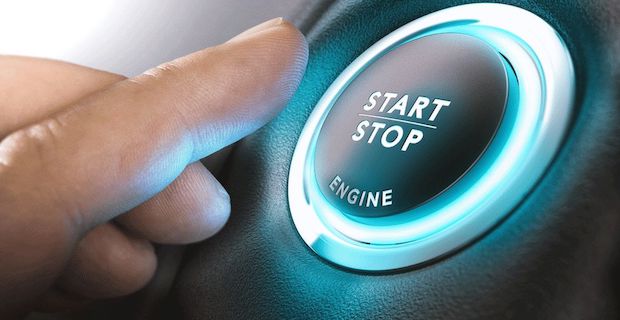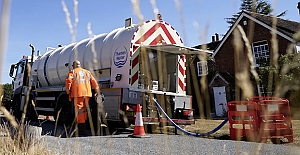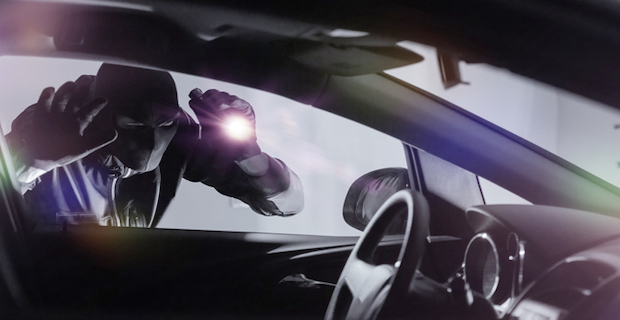The Association of British Insurers (ABI) said £376m was paid out by its members last year following vehicles being stolen, a 29% rise on 2017.
While it has no data on what proportion of these were keyless vehicles it said thefts of these cars had risen.
Researchers have said some new car models are vulnerable.
In its theft-risk report, published earlier this month, Thatcham Research gave several cars a poor security rating, including the Ford Mondeo, Hyundai Nexo, Kia ProCeed, Lexus UX and the Toyota Corolla Hybrid.

However, car industry trade body the SMMT criticised the methodology in the report.
Also, Thatcham initially rated the Porsche Macan as "poor", but retested the car and graded it as "superior".
The ABI said the number of insurance claims for car thefts had risen by 12% to 56,000 in 2018 compared with 2017.
However, it suggested that the average vehicle insurance premium had fallen owing to competition in the market.
Laurenz Gerger, the ABI's motor policy adviser, said: "The resurgence in car crime is worrying. The record amounts paid to motorists by their insurers in part reflects the vulnerability of some cars to keyless relay theft.
"Action by motor manufacturers to tackle this high-tech vulnerability, allied with owners taking some simple, inexpensive precautions will help reverse this unwelcome trend."
How keyless theft works
Keyless car entry systems let drivers open and start their cars without taking their key out of their pocket.
Thieves, normally working in pairs, will target a car parked outside a house.
One criminal will hold a device close to the car that boosts the signal meant for the key, while the other thief will stand close to the house with another device that relays that signal to the key, fooling the system.
Once the cars have been stolen, they will be stripped for parts, police say.
BBC NEWS


 After Nesil Caliskan a by-election will be held in Jubilee ward in Enfield
After Nesil Caliskan a by-election will be held in Jubilee ward in Enfield Publishing the analysis, Labour’s Cllr Ergin Erbil said Everybody in Enfield deserves basic rights
Publishing the analysis, Labour’s Cllr Ergin Erbil said Everybody in Enfield deserves basic rights Gaza-Israel conflict Statement from Cllr Ergin Erbil, Leader of Enfield Council
Gaza-Israel conflict Statement from Cllr Ergin Erbil, Leader of Enfield Council Cllr Ergin Erbil was elected as the new Leader of Enfield Council
Cllr Ergin Erbil was elected as the new Leader of Enfield Council Sustainable Development and ESG, Will This Become the Course for Turkic World
Sustainable Development and ESG, Will This Become the Course for Turkic World Thousands evacuate Santorini as more earthquakes strike island
Thousands evacuate Santorini as more earthquakes strike island Rauf Raif Denktas and Dr. Fazıl Kucuk II. International Cyprus Studies
Rauf Raif Denktas and Dr. Fazıl Kucuk II. International Cyprus Studies We continue our promotional activities in Europe, primarily in the UK said Ahmet Aras
We continue our promotional activities in Europe, primarily in the UK said Ahmet Aras Saran Media And Euroleague Basketball Extend Media Rights Partnership for Four More Years
Saran Media And Euroleague Basketball Extend Media Rights Partnership for Four More Years Will Rangers be Jose Mourinho’s next victim?
Will Rangers be Jose Mourinho’s next victim? Jose Mourinho's Fenerbahce face Rangers on Thursday
Jose Mourinho's Fenerbahce face Rangers on Thursday Inzaghi stated that they felt the absence of our national player Hakan Çalhanoğlu
Inzaghi stated that they felt the absence of our national player Hakan Çalhanoğlu Why is Thames Water in so much trouble?
Why is Thames Water in so much trouble? Plans revealed for the next proposed Superloop express bus route in the Thamesmead
Plans revealed for the next proposed Superloop express bus route in the Thamesmead Gatwick second runway backed by government
Gatwick second runway backed by government British Kebab Awards 2025 winners
British Kebab Awards 2025 winners
















